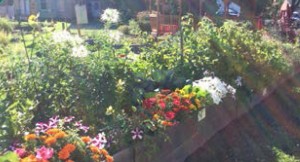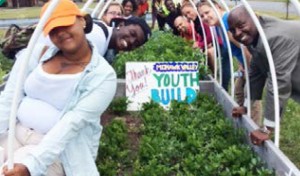Boylan’s classes recognized by NYS Dept of Health
 In the Field, a publication of the New York State Department of Health has recently acknowledged the work of SUNY Polytechnic Institute Associate Professor Kristina Boylan and her two interdisciplinary studies classes – IDS 102 Art and Culture and IDS 103 Science, Technology, and Human Values: Food in Society.
In the Field, a publication of the New York State Department of Health has recently acknowledged the work of SUNY Polytechnic Institute Associate Professor Kristina Boylan and her two interdisciplinary studies classes – IDS 102 Art and Culture and IDS 103 Science, Technology, and Human Values: Food in Society.
Students researched, designed, and contributed materials that were compiled into the gardening journals used successfully by the Summer Children’s Gardening Program in the City of Utica in June-August 2015.
The article, titled Utica Unity Gardens Offer a Welcome Urban Retreat discusses the community effort that went into encouraging community socialization, improved access to nutritious fruits and vegetables, and fostering neighborhood beautification and revitalization through community garden projects through some of the city’s low-income neighborhoods. The community garden project currently consists of several gardening sites in various sizes and can be found at sites within the city of Utica that include WIC (Women, Infants, and Children); the Utica Rescue Mission; the Salvation Army’s meal site; Kennedy Plaza Apartments; Sculpture Space; the Utica Public Library; and along Park Avenue.
A project team developed the Summer Children’s Gardening program which supported 140 children at four of the gardening sites. There, children ranging from pre-school age to grade six learned gardening basics such as planting, watering, harvesting, and composting while caring for their own plants in their own raised bed garden plots. Children’s gardening journals, sometimes known as workbooks, were developed in partnership with Boylan’s classes at SUNY Poly.
 Boylan says the idea for the involvement of her classes grew as a collaboration with then-local activist and Empire State College student Dae Anderson, who now manages organic farms near Oswego, NY. A conversation between Anderson and Boylan at a farmer’s market led to the idea of creating a hands-on project for Boylan’s section of IDS 103 Science, Technology and Human Values with the focus of Food in Society in Spring 2011, in which the students were asked to start seedlings for donation to a community garden coordinated by Anderson, while blogging about the process.
Boylan says the idea for the involvement of her classes grew as a collaboration with then-local activist and Empire State College student Dae Anderson, who now manages organic farms near Oswego, NY. A conversation between Anderson and Boylan at a farmer’s market led to the idea of creating a hands-on project for Boylan’s section of IDS 103 Science, Technology and Human Values with the focus of Food in Society in Spring 2011, in which the students were asked to start seedlings for donation to a community garden coordinated by Anderson, while blogging about the process.
“Support from the Biology/Natural Sciences faculty and staff has been essential, and very much appreciated, in doing this since its inception, as they both donated space in their lab and on their indoor growing stands, plus logistical support,” Boylan said. “That support includes letting students and me into the labs to care for plants, maintaining the plants between the end of the semester and when final frost warnings have passed, usually the end of May.”
She took a year off from the project when her son was due in May 2012, but Boylan says they picked up the project again in 2013 and the IDS 103 classes have been growing seedlings for various community gardens and blogging about the experience ever since.
“In 2014, Mister Anderson was contracted to give a course on gardening and food-based small business ideas at the Mohawk Valley Resource Center for Refugees,” Boylan explained. “This was a natural fit for seedling donations, and also gave me the opportunity to meet some of the master gardeners from Cooperative Extension who were working with the project, as well as Cathe Bullwinkle, who then worked for the Oneida County Department of Health.”
Bullwinkle would go on to work for the New York State Department of Health, but Boylan calls her instrumental in seeking support for the community gardens that were built in the Park Ave Triangle behind the Utica Public Library. That became the location for the refugee garden project in Summer 2014. Some of the plants from Boylan’s class went to that program, while others were passed on to a parallel program offered to children who attend the Thea Bowman house summer day camps.
“In conversation with Ms. Bullwinkle later that summer, asking what else students could contribute, she suggested that some educational materials or plant-related artwork for kids to work with could help support the program,” Boylan said. “This gave me the idea of getting students enrolled in the fall semester IDS 102 “Art and Culture” class involved, as a main theme of that class is representation of culture–she hoped that materials could be produced that the children could see themselves in, whether multi-generation Utica residents or recent arrivals.”
The output of the Fall 2014 Art and Culture class was compiled by Bullwinkle’s office and became two workbooks used in the Summer 2015 gardening program, which Bullwinkle then credited for the In the Field article.
“In Spring 2015, I had my IDS 103 class grow seedlings and blog about it, as well as produce educational materials for the gardening program. Being that they were received later, they were used as individual activities rather than being bound into the workbooks,” Boylan said. “My current IDS 102 class is working on a new iteration of the garden workbook assignment, and I am making plans to continue both projects in the Spring IDS 103 class.”
For both the younger children and the college students, particularly those from urban and suburban areas who have never been involved in any sort of food production, Boylan says there is no better way to think through the advance planning, decision-making, and risk-taking of food production and try it for oneself. That’s why community gardens are so important to communities and those within them.
“Thinking through the range of choices people have, particularly in dense, urban environments, to access fresh food, and to experience first hand the investments of time, effort, and commitment, plus the vagaries of weather, animal pests, unfriendly or freeloading humans, etc, can be read about – but we learn more when we experience it,” Boylan said. “There is a clear and positive relationship between the strength of the students’ more formal writing and their engagement with the service projects, too, which adds even more value to including these additional and nontraditional projects into the classes.”
During the Spring 2016 semester, Boylan is incorporating two new activities – support for new gardening projects in West Utica, and a hands-on, DIY bread-baking experience with the support of Sodexo. Boylan says both activities will complement critical reading and analysis of the agricultural revolution and dietary choices.
Recent Comments
Archives
- September 2018
- August 2018
- May 2018
- April 2018
- March 2018
- February 2018
- January 2018
- December 2017
- November 2017
- October 2017
- September 2017
- May 2017
- April 2017
- March 2017
- February 2017
- January 2017
- December 2016
- November 2016
- October 2016
- September 2016
- August 2016
- May 2016
- April 2016
- March 2016
- February 2016
- January 2016
- December 2015
- November 2015
- October 2015
- September 2015
- August 2015
- May 2015
- April 2015
- March 2015
- February 2015
- January 2015
- December 2014
- November 2014
- October 2014
- September 2014
- August 2014
- May 2014
- April 2014
- March 2014
- February 2014
- January 2014
- December 2013
- November 2013
- October 2013
- September 2013
- August 2013
- June 2013
- May 2013
- April 2013
- March 2013
- February 2013
- January 2013
- December 2012
- November 2012
